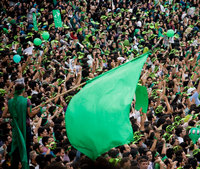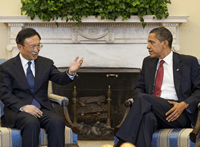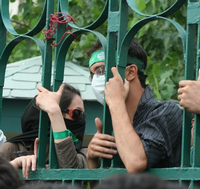Interesting bit of accounting by Geoffrey Forden at Arms Control Wonk, who does a “back of the napkin” calculation of how much the Natanz enrichment facility has actually cost Iran. Grand total? $270 million. There are broader costs associated with Iran’s nuclear program, but for now, the most troubling component at the heart of the diplomatic standoff remains the uranium enrichment going on at Natanz. For a facility that now dominates the region’s strategic agenda, that seems like a pretty good return on investment. It also means that whatever actual infrastructure damage, in dollar terms, that any airstrike might cause […]
Iran Archive
Free Newsletter
Looks like I wasn’t the only one to scratch my head about the eagerness to condemn what transpired in Honduras as an anti-democratic, extral-legal military coup. Jason Steck, writing at RCW’s The Compass, tries to clear things up: What both sides miss is that a “coup” isn’t always extralegal. In short, what is happening in Honduras may be an example of a coup that is not only legal, but mandatory. The oddness of this concept to American minds requires an explanation. [. . .] . . . [S]ome countries explicitly endow their military with a role inmaintaining democratic governance. . […]
Worth noting that the Obama administration is not the only government facing tough choices about how to respond to the recent events in Iran. Germany, too, has experienced some divergences of opinion about whether a firm response on human rights should take priority over the need for a negotiated settlement to the nuclear standoff. As for the Russians, they’re deciding whether the events should get in the way of a signed-sealed-but-not-yet-delivered contract with Tehran for S-300 missile defense systems. Richard Weitz devoted one of his WPR columns to explaining the system’s significance. In a nutshell, it would make an airstrike […]
Depending on who you read, or who you believe, the post-election turmoil in Iran has either, 1) faded into a more repressive version of the status quo ante, with a more central role for the Revolutionary Guard and a resigned opposition that no longer credits the regime with any legitimacy; or 2) gone into hibernation mode, with a number of compromise (i.e., political) solutions still possible and/or the revolutionary fervor still roiling under the surface. It doesn’t take a genius to notice that the two are not mutually exclusive. Nor are the two clauses of the second option, for that […]

Four decades ago, when police and national guardsmen attacked protestors at the Democratic National Convention in Chicago, the protesters shouted, “The whole world is watching.” However arresting those images were, they could not possibly compare to the flood in recent weeks of YouTube videos, Flickr photos, Twitter tweets, Facebook pages, and blogs dedicated to events in Iran. Today, the world is not only watching — in an important way it is participating, as observers dig down for their own raw footage, reporting, and analysis pouring out of Iran. It is easy to be swept up by all of these images […]
In President Barack Obama’s restrained reaction to the upheaval in Iran, pragmatism won out. The administration’s calculation was that, in the long run, the United States was still going to have to do business with Iranian President Mahmoud Ahmadinejad. But Obama also avoided adding to what is widely perceived as America’s history of encouraging revolutions and then not supporting them. To mention two: References to the 1956 uprising in Hungary resurfaced this week because many Hungarians are still bitter that the West — and particularly the United States — failed to come to their aid in fighting Soviet troops. Radio […]

With events still unfolding inside Iran, it is not yet clear how things will pan out for the Islamic Republic, which now faces its greatest challenge since the regime’s early revolutionary days. But the reverberations of Iran’s internal tumult since the June 12 presidential elections are potentially far-reaching: Iran’s Arab neighbors, Israel, the European Union and, perhaps most importantly, the United States, are all observing developments closely to see how the crucial Middle East power’s internal ructions might impact their own strategic interests. The Obama administration initially chose to tread cautiously, not wanting to hand Iran’s hardliners a rhetorical weapon […]
So far, all the coverage I’ve seen of the U.S. and Venezuela normalizing diplomatic relations suggests that Caracas is far more impatient to get the process finalized than is Washington. This Latin American Herald Tribune article, citing a government-friendly Venezuelan daily is typical. But even this BBC article, which at first glance seems to suggest that both sides are on board, on closer inspection cites the Venezuelan foreign minister. That probably has to do with the fact that the Chavez-Ahmadinejad lovefest the past week makes for less-than-ideal political optics for President Barack Obama. But Chavez’s eagerness to formally restore ties […]

The political turmoil in Iran has brought new meaning to the maxim, “All politics is local.” In the age of disappearing distances, the fallout from rigged vote-counting in Tehran, Shiraz or Esfahan presents local challenges and opportunities to politicians in Fort Wayne, Beirut or Tel Aviv. Just as authorities in Tehran prove incapable of stopping the flow of information out of the country, the impact of Iran’s post-election crisis has also spilled across its borders, becoming an event with domestic repercussions around the globe. In the West, the crisis in Iran has created a platform on which politicians can stand […]
In light of the hand-wringing Stateside about what the U.S. official reaction to events in Iran should be, it’s interesting to take note of the reaction of a country whose stance arguably has more of a direct impact in Iran — namely, Turkey. Yigal Schleifer flags this Der Speigel interview, in which Turkish Foreign Minister Ahmed Davutoglu steps very gingerly around the issue of passing judgment on the Iranian election and political process. He also de-dramatizes the recognition of Ahmadinejad’s election “victory” as a mere diplomatic formality between “nations with friendly relations,” and explains why Western perceptions of Iran’s political […]
The paradox of the situation in Iran is how such an opaque regime operating in such a confusing media landscape can be revealing so much about itself. One thing I’d add to the list of “minutae” to be watched are any Revolutionary Guard deployments to locations that are not on our list of “known knowns.” My hunch is that this is the kind of climate in which the regime will secure the most sensitive facilities involved in the nuclear program. Since any weaponization activity at this point has to be conducted in a “black site,” a major deployment could be […]

China’s global priorities might not match up that well with those of your average American policymaker. But they do match up quite well with President Obama’s agenda. That’s the sense I got after spending last week in Shanghai with a bevy of China’s top foreign affairs academics. Although the workshop I attended was focused on U.S.-Chinese relations, there was no shortage of side conversation on the post-election meltdown unfolding in Iran. And nothing I heard in terms of the Chinese sense of priorities bore any resemblance to what you see these days in American newspaper headlines. As during the Cold […]
To veteran news correspondents — including this one — who were in Tehran in 1979, some of the events unfolding last week were eerily familiar. Thirty years ago, as this past week, the violent ebb and flow filled the streets day after day, as the Shah’s security forces battled supporters of Ayatollah Khomeini. Yet thirty years ago, there were surprisingly few actual deaths: Iranian army personnel carriers and tanks were tucked away in side streets in Tehran waiting for the order to suppress the unrest. But the Shah, weakened by cancer and under pressure from the Carter administration to limit […]

As we watch the dramatic events unfold in Iran, it is useful to reassess the merits of Iranian elections. Critics of the Islamic regime often dismiss presidential, parliamentarian (Majlis) and municipal elections as a manipulative sham used by a malevolent regime to flaunt its supposed legitimacy to the outside world. They may point to the current crisis as proof of their claim. Obviously, elections alone in the Islamic Republic of Iran do not make the country an ideal and transparent democracy. They do, however, provide for two unintended, yet noteworthy, outcomes that are rarely reflected upon in the West. First, […]

TEHRAN, Iran — Tehran has been the site of massive street protests on a scale unseensince the Islamic Revolution in 1979. Tens, and sometimes hundreds, ofthousands have defied government bans, live gunfire, tear gas and massarrests to protest against the election results and the government itself. The following are photos taken atopposition demonstrations in the aftermath of the contested electionresults. (George McLeod’s WPR Briefing on the escalating government crackdown on the protests can be found here.) Protesters with a picture of defeated reformist presidential candidate Mir Hossein Moussavi (George McLeod). The June 16 opposition protest demonstration snakes its way towards […]
Here is what the experts are saying about North Korea’s nuclear strike capabilities in response to Pyongyang’s threats to test another long-range missile on July 4: Gen. James Cartwright, Deputy Head of the Joint Chiefs of Staff, said on Tuesday that North Korea would need three to five years to be able to launch a missile that was capable of reaching the West Coast of the United States. Hawaii and Alaska are already in range. Yesterday, Defense Secretary Robert Gates said that the U.S. is ready and able to deal with any short-term threats to Hawaii “should it become necessary.” […]
There’s nothing really surprising about Iranian Supreme Leader Ali Khamenei’s speech today. (Andrew Sullivan’s got the full text, and the Guardian has a write-up.) And appearances to the contrary, there’s nothing really untrue about it, either. Yet. By that I mean that up to now, this really has been a conflict that has remained within the institutional structure of the state. By drawing the line today — and he really had no choice but to do so — Khamenei has essentially forced Moussavi to decide whether his opposition will remain in the realm of politics, or cross over into the […]
